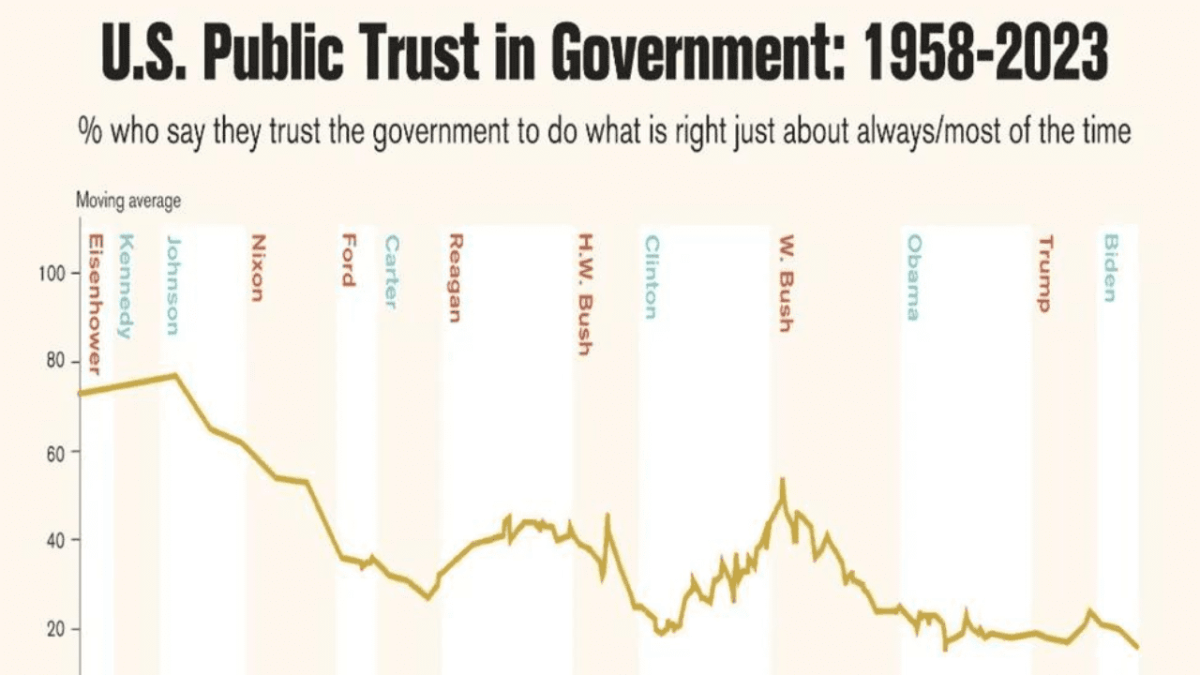First, what the hell is this polling question: “% who say they trust the government to do what is right just about always/most of the time?” Is this just the federal government, or all layers of government? Isn’t there an enormous difference between “just about always” (say, 80-90% of the time) and “most of the time” (51%)?
Second, he buries the lede a bit about the breakdown in public trust:
Ronald Reagan, with his optimistic “Morning in America” nudged up government approval rates to 46 percent in 1985. But ironically, and tragically, he did so by attacking government itself. In 1986, while running for a second term, he said at a press conference, “the nine most terrifying words in the English language are: I’m from the Government, and I’m here to help.”
That’s basically it. For nearly half a century now, we’ve had nonstop propaganda from half the politicians in this country that government = bad. And the other half dabble in it pretty frequently. That’s going to produce a pronounced decline in trust no matter the underlying economic facts or the occasional news cycle about an actual governmental lie.
We occasionally see deep-rooted cynicism here about the possibility of any level of American government producing anything good. That plays into this fundamentally reactionary narrative and isn’t strictly accurate, anyway. The better approach is to acknowledge decent things on those rare occasions when they happen, then point out how much more could be done.
Edit:
 might have thought he was running for a second term in '86, but his second term started in '84.
might have thought he was running for a second term in '86, but his second term started in '84.This article seeks to explain why the majority of the population does not trust the government’s reporting on the health of the economy but assumes the metrics are valid without interrogation. Inflation is down, but a decrease in a second order derivative only means that things are getting more expensive at a slower rate. I’m not immediately sure what the gov actually looks at in this calculation but we’ve got the Krugman tweet kicking around about how great everything is going if you exclude food, energy, and housing costs, which are the bulk of people’s expenses and exactly where they are feeling that (now slower) increase.
Wages are said to have increased, but as always, those gains are not evenly distributed.
Unemployment being at a record low does not mean a great deal when the unemployment numbers are cooked. People who are unable to work or have given up looking are excluded from this metric and we remain in a pandemic that has cost millions or lives and left many more unable to work.
It’s not just that the government has erroded its credibility over decades, it’s that it still has no credibility and the figures it presents should not be taken at face value.
Let’s be real, some of the collapse under LBJ was Vietnam and much of it was kkkrackers mad about civil rights. Thanks to the democrats’ brief experiment with supporting unions combined with WW2’s huge growth of the military industrial complex, a lot of organized labor was in weapons manufacturing and supported the war.
Gone was the 1930s understanding that government was needed to protect the people from corporate power. Gone was the idea that in hard times government should put people to work. Gone was the idea that Wall Street needed strict regulations.
This is the job of government, and while we do need to restore this sentiment somehow…good luck, considering everyone’s retirement nest eggs - if they’re lucky enough to even have one - are tied up in target retirement date index funds. They have us by the balls, and have complete regulatory capture.
The author later posits that labor unions are our last best hope. In lieu of the bought and paid for Congress actually doing their jobs and regulating, I agree, but some industries are insanely slow to come around to this idea (I’m looking at you tech sector.)




